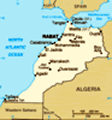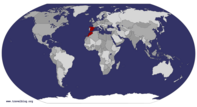Advertisement
Published: April 23rd 2010
Why should I visit the Ourika Valley? My third trip to Morocco was a long weekend with my husband Dave, a kind of second honeymoon to make up for the fact we didn't have a first one when we married ten years earlier. After two days looking at the majestic Atlas Mountains in the distance from our hotel balcony, Dave and I decided it was time to take a closer look. We booked a day trip through Complete Tours http://complete-tours.com/ to the Ourika Valley, about 30 kilometres outside the city. A journey of about three hours each way on the meandering mountain roads in a little air conditioned Grand Taxi with our driver/guide, Driss.
As we left the madness of Marrakech the buildings thinned out and orchards of orange tress and olive groves, a few ramshackle buildings and the odd mosque, bordered the dusty road. Slowly the distant mountains grew larger and lost their painted backdrop appearance as we began our almost imperceptible climb. As we left the open plains the roads began to wind and the hills started to rise up around us, becoming higher and higher as we climbed. The further we went the greener everything looked. The
snowy peaks were now just tantalising glimpses between trees and hills. I could feel the temperature dropping, which was refreshing after the heat of the city. The air felt crystal clear.
Driss explained how the icy water, melting from the snow on the mountain peaks keeps the desert at bay. In Marrakech they have made a complicated system to use this water to irrigate the city, which is why it looks like such a green oasis as you fly in. Apart from the vegetation, the thing that struck me most was how red the earth was here. Deep, rich ochre red unlike anything I had seen before.
As we got higher we passed little villages, higgledy-piggledy houses clustered together on the hillsides. Some seemed to be little more than mud huts but every single one, no matter how small had a satellite dish attached to it. Driss told us that these dishes are relatively cheap, even the poorest family can afford one and, unlike in the UK, once they have paid for it and set it up there is no monthly subscription just free TV channels from every country they can pick up. That explained the cries of ‘I give you good price, Asda price,’ in the souks. No wonder they all speak so many languages! I wondered how they power their TV’s as some of the houses have no electricity or running water and Driss explained that they have solar panels. As the sun shines 365 days a year they always have TV.
Even here it's obvious the Moroccans are a nation of merchants. Every so often we saw their wares set up at the side of the road, tagines and pots or textiles, jewellery and the usual bric-a-brac. Young boys ran beside each car as it passed holding out hand woven baskets filled with little red fruits. Whenever the car stopped to negotiate a tricky corner they were almost in the window. Driss told us they pick the fruits, which taste a bit like strawberries, from the local bushes. They will sell whatever is available, making things out of anything they can find. On Mondays and Fridays there is a day market but, as it was Tuesday, we missed it.
Once the river came into view we saw Berber women doing their washing. Driss explained that the Berbers who live up here are a hardy bunch. The women do most of the work and all the men seemed to be sitting around in the shade smoking, drinking mint tea and chatting. Needless to say Dave really liked this idea!
We stopped to visit a Berber house belonging to one of Driss’s cousins. The native Moroccan population is made up of Berbers and Arabs and Driss was very proud of the fact that he is a Berber, although his wife is an Arab. As soon as we entered the village we picked up a stream of little Berber followers. When we booked the trip we were warned that the children would follow us as lots of tourists bring sweets for them but sweets weren’t such a good idea where there is no dental care. I felt mean not giving them anything so I had come prepared with a big bundle of cheap ballpoint pens. The children seemed to love these and were fascinated by clicking them on and off.
By Berber standards the family was a wealthy one but it was humbling to see how meekly they lived. Home and the modern conveniences we take for granted seemed a very long way off. The house, a two-storey affair made of mud and stone, had square, unglazed windows with wood and wrought iron shutters and a plain mud floor. There was very little furniture, just stone and mud platforms draped with colourful blankets and cushions that seemed to be used for sleeping and sitting. There was an old sofa in one room and this held pride of place. The oven was a domed affair made of mud in which a fire burned with a kettle humming on top. We were served mint tea in tea glasses like those I had bought in the Marrakech souks the day before, poured with great ceremony from a silver tea pot.
The courtyard seemed to be filled with chickens, cows dogs and children and there was a water filled ditch. I guess it channelled water running down from the mountain, their only visible supply of running water. It was only after I left that I realised I hadn't seen a TV anywhere. I guess it was hidden away in one of the rooms I didn’t go into.
Driss also took us to a tiny building where the grain in ground to make bread. It was so small we could hardly stand and the miller sat beside a stone wheel amid the dust from the flour. There was a large version of the stone oven from the Berber house where we were told the women of the village bring their bread each day to be baked. The heat was almost overwhelming and we didn’t stay too long.
Our next stop was a visit to Setti-Fatma and its seven waterfalls. A word of warning here, this trip is not for the feint hearted. The first obstacle was a rickety bridge across the river. I nearly gave up there and then. The bridge was nothing more than a few ropes and pieces of wood, which swayed alarmingly as we crossed.
Next it was a long hard climb over rocks made slippery in places from the little springs and streams. My little legs found some of the stones quite hard to negotiate and, although I consider myself quite fit (I go to the gym most days) I was hot and out of breath in quite a short time. Perhaps it was the higher altitude or maybe I'm not as fit as I thought I was. The climb seemed to take forever and I was embarrassed, while puffing and panting, to be overtaken by a series of Berber women with large bundles on their heads striding along as if it was just a gentle slope.
To my shame, we only made it as far as the first waterfall. Apparently it takes two hours or more to climb up to all seven and, for the really daring with a whole day and night to spare, it is possible to climb even further to the peak of Mount Toubkal where there are some prehistoric rock carvings. Apparently you can even ski up on the high slopes. Skiing in Morocco, now there's a thought.
There is a little café at the waterfall where we stopped to take in the view, catch our breath and have a cooling drink of Coca cola served in real glass bottles with the Coke logo in English and Arabic. The climb down over the slippery rocks was more difficult that the climb up and I had a few hairy moments where I slipped and thought I would end up in a broken heap at the bottom. Thankfully we all made it back in one piece but I really wouldn’t recommend this hike for the feint hearted or anyone not fit and wearing good shoes. A walking stick would probably help too.
By this time we were starving so we stopped for lunch at the Auberge Ramuntcho http://www.ramuntcho.ma/, a beautiful little restaurant and guest house. We sat on the terrace, relaxed and enjoyed the wonderful views of the river and the high, red mountain along with our chicken tagine and a bottle of well deserved wine.
The wild cats that seem to be everywhere in Morocco wandered around our table and twined around our legs waiting for a piece of dropped food. The food was wonderful, made even tastier by appetites sharpened by our hike into the mountains. A perfect end to a perfect trip.
Advertisement
Tot: 0.085s; Tpl: 0.011s; cc: 9; qc: 51; dbt: 0.0435s; 1; m:domysql w:travelblog (10.17.0.13); sld: 1;
; mem: 1.2mb








